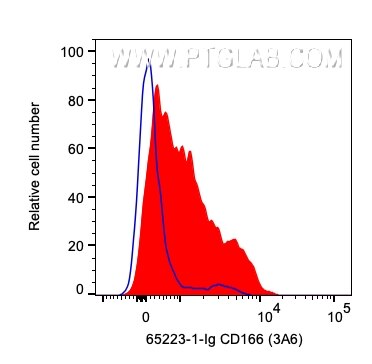Tested Applications
| Positive FC detected in | PHA treated human PBMCs |
Recommended dilution
| Application | Dilution |
|---|---|
| Flow Cytometry (FC) | FC : 0.2 ug per 10^6 cells in 100 μl suspension |
| This reagent has been tested for flow cytometric analysis. It is recommended that this reagent should be titrated in each testing system to obtain optimal results. | |
| Sample-dependent, Check data in validation data gallery. | |
Product Information
65223-1-Ig targets ALCAM in FC applications and shows reactivity with Human samples.
| Tested Reactivity | Human |
| Host / Isotype | Mouse / IgG1, kappa |
| Class | Monoclonal |
| Type | Antibody |
| Immunogen |
Cultured human thymic epithelial cells Predict reactive species |
| Full Name | activated leukocyte cell adhesion molecule |
| Calculated Molecular Weight | 105 kDa |
| GenBank Accession Number | BC057809 |
| Gene Symbol | ALCAM |
| Gene ID (NCBI) | 214 |
| RRID | AB_2935133 |
| Conjugate | Unconjugated |
| Form | Liquid |
| Purification Method | Protein G purification |
| UNIPROT ID | Q13740 |
| Storage Buffer | PBS with 0.09% sodium azide, pH 7.3. |
| Storage Conditions | Store at 2-8°C. Stable for one year after shipment. |
Background Information
Activated leukocyte cell adhesion molecule (ALCAM, also known as CD166) is a cell adhesion molecule that belongs to the immunoglobulin superfamily. It is involved in cell-cell adhesion through homophilic and heterophilic (to CD6) interactions. ALCAM is widely expressed in a variety of normal tissues and cell types, including activated T cells and monocytes, epithelial cells, fibroblasts, neuronal cells, hepatocytes, and bone marrow mesenchymal stem cells (PMID: 7760007; 25221999). Altered ALCAM expression has been associated with the differentiation state and progression in some neoplasms including melanoma, prostate, colorectal, and breast cancers (PMID: 20461761; 18172759).
Protocols
| Product Specific Protocols | |
|---|---|
| FC protocol for ALCAM antibody 65223-1-Ig | Download protocol |
| Standard Protocols | |
|---|---|
| Click here to view our Standard Protocols |




